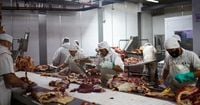For generations, beef has been more than just a staple in Argentina — it’s a cultural cornerstone, found sizzling on backyard grills and featured at nearly every family gathering. But over the past few years, this proud tradition faced an unexpected challenge. Soaring inflation, recession, and mounting poverty forced many Argentines to swap their beloved steaks for cheaper alternatives. Now, a dramatic economic turnaround is helping to restore beef’s place at the heart of Argentine life, according to reports from the Rosario exchange and Reuters.
On Friday, August 8, 2025, the Rosario exchange released data confirming what many butchers and restaurant owners had already noticed: beef is making a juicy comeback. The average Argentine consumed 50.2 kilograms of beef in the first half of 2025, up from 47.6 kilograms during the same period last year. That’s a notable jump, especially considering the country’s recent economic woes.
What’s behind this renewed appetite? It comes down to a combination of rising wages, moderating inflation, and a supply glut that’s keeping more beef at home. Registered workers saw their average salaries surge by an eye-popping 62.5% in the year leading up to May 2025. While beef prices did climb 59% over the same period, consumer inflation was held to 39% — a huge improvement from the triple-digit annual increases that plagued Argentina not long ago.
“As inflation begins to ease and allows the consumer’s pocket to loosen up, albeit slowly ... beef consumption tends to recover the place of preference it has historically occupied within the local consumer’s shopping basket,” the Rosario exchange study explained, as quoted by Reuters. In plain terms: as people feel a little richer, they’re putting steak back on the menu.
The shift is deeply tied to the policies of President Javier Milei, whose libertarian, austerity-focused approach has been both praised and criticized. Supporters point to the sharp drop in inflation and the stabilization of the peso as proof that tough medicine is working. Critics, meanwhile, warn that the gains are fragile and uneven, with many Argentines still struggling to make ends meet. But the numbers don’t lie: for the first time in years, wage growth is outpacing inflation, giving families some breathing room.
Of course, it’s not all sunshine and sizzling steaks. While domestic demand has surged, Argentina’s beef exporters are facing a rough patch. The Rosario exchange noted that beef exports fell by 19% in volume, hit hard by volatile exchange rates. That’s left more beef available for local consumption, which has helped absorb the supply glut but also raised questions about future pricing. “The question going forward is how long (local) consumers will be willing to accept the increased supply without a price adjustment,” the exchange cautioned.
It’s a delicate balance. If prices rise too quickly, families could once again be forced to tighten their belts. If they stay low, producers might struggle to stay afloat. For now, though, the mood is upbeat in butcher shops and steakhouses from Buenos Aires to the Pampas.
The story of Argentina’s beef revival is really the story of its people’s resilience. Last year, many households were forced to cut back on their favorite cuts as inflation soared, unemployment rose, and poverty deepened. Cheaper meats like chicken and pork became the norm, and the country’s famous asado barbecues grew less frequent. But as the economy has stabilized, Argentines are returning to their culinary roots with gusto.
“It’s not just about food — it’s about identity,” said a Buenos Aires butcher, echoing a sentiment heard across the country. “When people can afford beef again, it means they’re starting to feel hope.”
That hope is reflected in the numbers. The Rosario exchange’s report linked the uptick in beef consumption directly to rising purchasing power. Salaries for registered workers jumped 62.5% in the year to May 2025, while inflation cooled to 39%. Even though beef prices rose 59%, the increase was manageable for many families, especially compared to the punishing price hikes of previous years.
President Milei’s policies have been a major driver of these changes. His government slashed public spending, liberalized markets, and sought to restore confidence in the peso. The measures weren’t without pain — public sector layoffs and subsidy cuts sparked protests and political backlash. But the payoff, at least for now, appears to be a more stable economy and a return to moderate inflation.
Still, challenges remain. Exporters are feeling the pinch as exchange rate swings make it harder to compete abroad. According to the Rosario exchange, the 19% drop in export volume has created a domestic supply surplus, helping keep prices in check but potentially threatening the long-term health of the beef industry. And while wages have risen, not all Argentines are benefitting equally; informal workers and the unemployed still face significant hardship.
Argentina’s love affair with beef runs deep. The country is legendary for its steakhouses and asado barbecues, where families and friends gather around open flames to share thick, juicy cuts. For many, beef is more than a meal — it’s a symbol of national pride and togetherness. The recent economic crisis threatened that tradition, but the latest data suggests a cautious return to normalcy.
Looking ahead, the big question is sustainability. Will the economic rebound last? Can exporters regain their footing? And will beef remain affordable for the average family? The Rosario exchange summed it up best: “The question going forward is how long (local) consumers will be willing to accept the increased supply without a price adjustment.”
For now, though, Argentines are savoring the moment. The clink of forks and knives, the smoky aroma of grilled meat, and the laughter around the dinner table signal a tentative but welcome recovery. As one local put it, “When you can have a good steak again, you know things are starting to look up.”
Argentina’s beef comeback is more than an economic statistic — it’s a testament to the country’s enduring spirit and its unbreakable bond with a cherished tradition.

